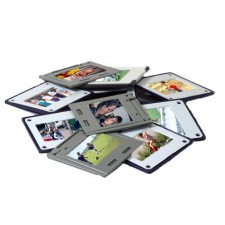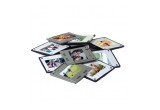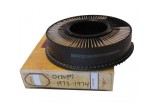
Having your slides scanned to digital can feel overwhelming, but it doesn't have to be. Just follow a few simple tips, and it will make the preparation much more manageable.
Pleasant View, Utah, May 3, 2017 (Newswire.com) - Larsen Digital, a photo, film and video scanning service provider, has shared their 5 top tips in preparing slides to be scanned digitally. Having one’s slides scanned can feel like an overwhelming task, but with these 5 tips, it can make the impossible, possible.
#1 Don’t Reinvent the Wheel
Look at your current organization: Is it all jumbled in a box? Or are your slides sloppily thrown into carousels or Bell & Howell cubes? Chances are, if they are in carousels or those little yellow Kodak boxes, there is already the beginning stage of a chronological order. Don’t start your organization from scratch — use what is already there and try to clean up the messy organization that already exists. Look at what is written on boxes and even what is written on the slide mounts. Use what you have!
#2 Don’t Try to Organize by Person
Unless your family never vacationed together, never celebrated holidays together or took a group photo, organizing by person is a bad idea. Not only will you abandon this idea halfway through (because it’s impossible), but you will literally break up the essence of your family memories — which is your FAMILY. Organizing by person will create an incomplete and fragmented story of one’s life. The purpose behind this idea is simple; you want to easily share photos for each family member. That is one of the many reasons why going digital is amazing, it is simple to share ALL your digital photos with ALL family members in an instant.
#3 Not All Film Is the Same
When creating your groups, put all your 35mm slides first, then 126 format slides, 127 format slides, then stereo slides. It doesn’t matter the order each group is stacked, but you don’t want different slide formats intermingled. Why? Because each slide has different film dimensions and different scanning needs. Plus, depending on the mount size, the slides will need to be scanned on different machines. If you don’t separate the slides, your scanning provider will, and then all of your painstaking organization is undone.
#4 Don’t Stress
Don’t stress yourself out or strain your eyes trying to view your tiny slides under a light. Once your slides have been scanned and are in a digital format, you can organize them on your computer. You can create folders on your computer and drag and drop your digital images in each folder. That is a lot easier than trying to view each slide and neatly label each group.
#5 What Is Your End Goal?
What is your desire when it comes to scanning your slides? Do you want to view them on your TV? Your computer? Share them with your family across the nation? Depending on this answer, it will affect how you should save these newly digitized images. If you have family that you want to easily share the files with, upload them to a cloud provider and let your family download the images. Another great option is to save all the files to an external hard drive and have a hard drive shipped to each family member. Another option is to have extra copies of discs made for each family member. Scanning the slides is where the majority of the cost is, so having extra copies of discs is usually a small extra fee. Don’t be afraid to call and talk to their customer service about your situation and see what they recommend.
Larsen Digital is a professional slide scanning service provider and has been in the business since 1995. As a family-owned company, Larsen Digital knows the importance of preserving family memories. For more information about slide scanning, visit us at Larsen Digital.
Source: Larsen Digital
Share:


